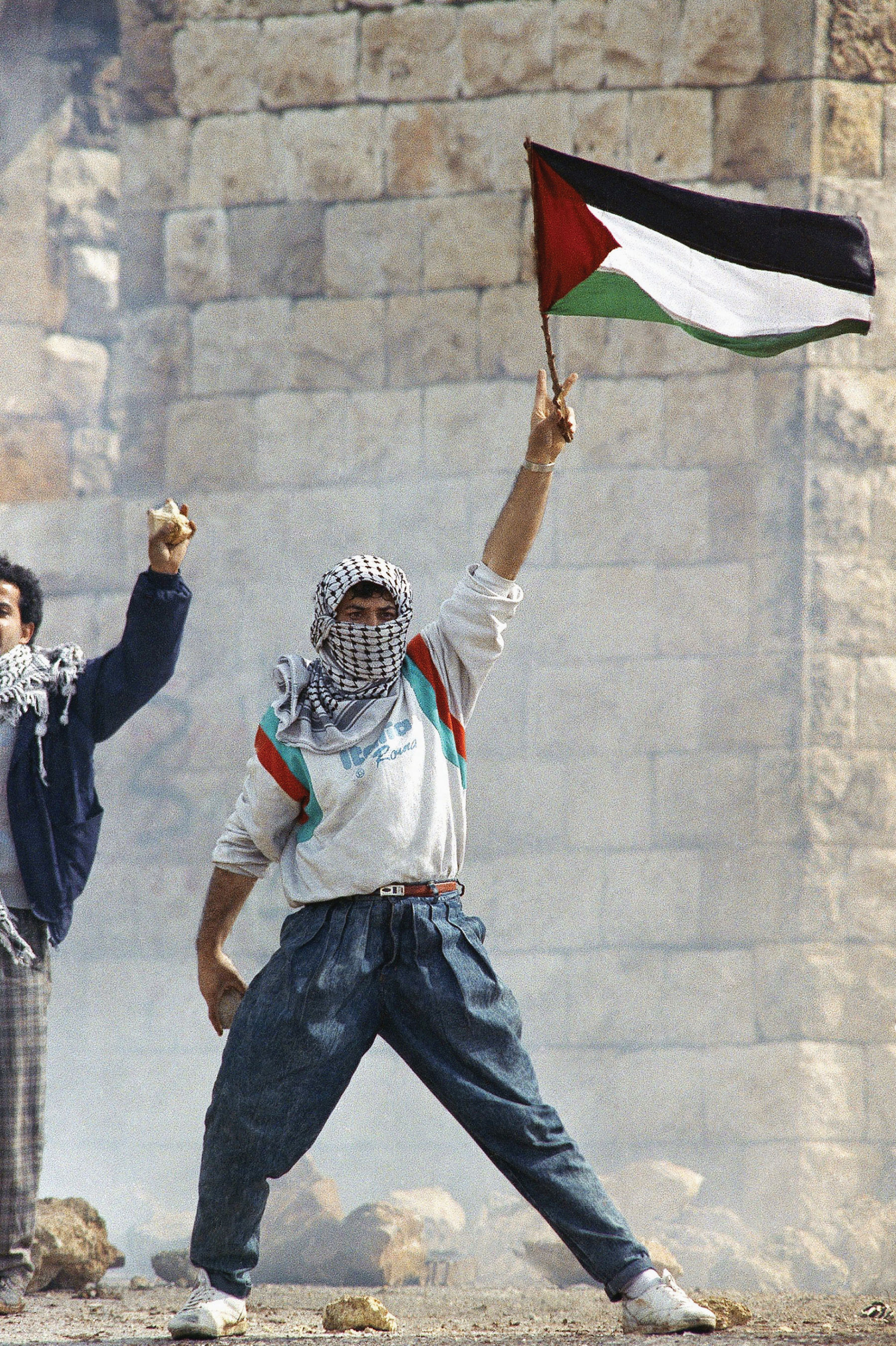Some people are trained to find news, but news and history came to Jawdat Mana‘a’s door. Born in 1952 in Dehaishe, a West Bank refugee camp, he began to write about it in 1980, after the camp was punished with a weeks-long curfew for the burning of an Israeli army jeep. He started sending stories to Palestinian newspapers, and people started sending him news of strife in other camps. He developed a sizable archive—“I have information about the camps, and photos, that go back to when I was born”—and he made contacts not just with Palestinian reporters, but with Israeli, European, and American journalists as well. Opening the Bethlehem Press Service in 1982 seemed only logical.
Last March 13, armed Israeli soldiers, police, and secret service officers entered Mana‘a’s offices, ordered them temporarily closed, and arrested him. Two of the soldiers carried M16s. “They took all my negatives, hundreds of photographs and papers, even the music cassettes I like to listen to when I work,” he says. Like many Palestinian reporters with nationalist sentiments, Mana‘a had been arrested before. This time he was jailed twenty days without being charged, and then he was accused of possessing material that could incite his people to rebel—photographs of demonstrations and people wounded in clashes with the army; a Fax machine; a cassette with Palestinian nationalist songs; and most damaging of all in the eyes of the authorities, one of the thousands of leaflets issued by the leaders of the intifadah, as the Palestinians call their eleven-month-old uprising. Well-liked by his foreign colleagues, Mana‘a assumes it was articles published abroad about his arrest that spurred the military authorities to release him without making him pay the bail—4,000 shekels, or $6,400—the court had imposed. His driver’s license was lifted, however, and he returned to find his phone lines cut.
Mana‘a is one of forty-seven Palestinian journalists jailed between the start of the intifadah last December and August 20, according to the Arab Journalists’ Association in the Occupied Territories. During that period, eight newspapers suffered temporary bans on distribution in the territories, the licenses of two magazines were permanently revoked, and three press services besides the one in Bethlehem were closed. At least one more journalist was arrested after that list was compiled, a copy editor for Al Fajr, whose editor, Hanna Siniora, is considered a spokesman for the most moderate wing of the Palestine Liberation Organization. Al Fajr has been particularly hard-hit, with eight journalists jailed and three deported.
Israel justifies these harsh measures on security grounds. The legal rationale comes from the Defense Security Regulations of 1945, which, along with some 1,300 military orders, impose restrictions on many aspects of life in the territories, including free expression. They were used sparingly until the mid-seventies and an upsurge of nationalism in the territories. Over the past eleven months they have been wielded unremittingly against the Palestinian press. Under the regulations, newspapers and magazines in the territories must submit to the military censor two copies of everything to be printed—from the weather to political analysis. The censor may remove anything deemed to be of “political significance.”
That phrase is broad enough, in the words of a 1986 report by Law in the Service of Man (a West Bank affiliate of the International Commission of Jurists), to include “any suggestion that West Bank inhabitants are suffering under occupation . . . and [any] representation of national aspiration.”
So the Palestinian press can’t even report on its own problems. Asked whether Al Fajr’s remaining staff had been able to write about their jailed and deported colleagues, an editor shrugged. “Write? It’s a big word. We can write that they have been arrested. We can say, ‘This man was arrested on such and such a day,’ but no one will know the details.” Another editor, who like most who were interviewed would not allow his name to be printed, says many reporters are reluctant to do legwork. “They say, ‘Why should we go out? The story will only be censored.’ ”
Still, some Palestinian reporters have found a partial detour around the censor. They feed their tips to foreign wire services, then reprint the resulting stories; once articles are published outside Israel’s borders, the censors seem to be less harsh. News of interest to residents of the West Bank and Gaza may also reach the Palestinian press by way of Palestinian reporters working for West Jerusalem–based foreign media. All ten front-page stories published September 10 by the East Jerusalem daily Al Quds, for example, were taken from foreign wire services. “I titled one story AMERICAN DELEGATION CALLS ON U.S. TO STOP MILITARY AID TO ISRAEL,” says Samaan Khoury, a West Bank journalist who works for Agence France–Presse. “The day after AFP ran it, I saw it with the same headline in five East Jerusalem papers.”
In theory, Israel could censor its own press. From time to time the prime minister and the defense ministry may decide that certain issues are national security matters (Israel’s 1982 invasion of Lebanon, for example). Israeli reporters must then submit stories about those issues to the military censor, who usually makes few, and minor, changes. “Censorship is really not a problem for us,” says Dani Rubinstein, a veteran correspondent of the Israeli daily Davar.
In fact, the Israeli press publishes vivid accounts of events that would be instantly censored in the territories, and are even fairly rare in the U.S. press: detailed descriptions of villages under siege for long periods, deprived of water, electricity, and food; eyewitness accounts of beatings and shootings of unarmed civilians; soldiers’ accounts of their feelings about meting out such punishment.
But such stories rarely get into the Palestinian press. In early September, Mana‘a covered an intifadah birthday party in a hospital. A patient had just turned seventeen, a boy from Mana‘a’s birthplace, Dehaishe, who had been critically wounded in the stomach by a soldier’s bullet the month before. Unable to eat, fed by intravenous tubes, he was clearly dying. Flowers bedecked the room; there was a picture of the illegal Palestinian flag over the bed. Someone blew out the candles on a three-tiered cake, and a doctor fed the patient two forkfuls of it. Young men from the camp, along with his parents and relatives, surrounded him. As at an intifadah funeral, they weren’t mourning the young man’s impending death, but celebrating his martyrdom to the Palestinian cause. Mana‘a reported the event for the foreign and domestic clients of his wire service, taking care to give only the barest facts and not to use the charged word intifadah. But it came back censored in full. “I always write,” Mana‘a says, when asked if he gets discouraged. “Whether or not it gets censored, I must try.”
TOP IMAGE: Palestinian youth in Sawiya, February 1988; AP Photo/Martin Cleaver



